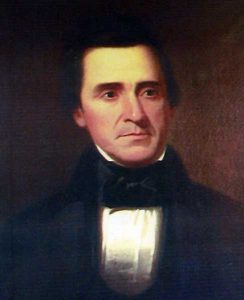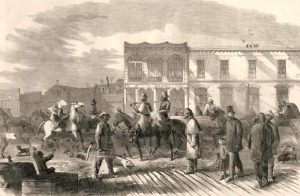David Rice Atchison was a jurist, United States Senator, and pro-slavery leader in Kansas.
Atchison was born in Fayette County, Kentucky, on August 11, 1807. William Atchison’s father was an industrious farmer of influence in the neighborhood. David was put in a grammar school at an early age but left it to enter Transylvania University, where he graduated. In 1828, he began to study law at the Lexington Law School, where he remained until he passed the Kentucky bar in 1829
He then went to Clay County, Missouri, located in the extreme northwest corner of the state. He quickly adapted himself to the life and society of the frontier, took part in politics, and soon became a prominent figure in the area. In 1834, he was elected to the state House of Representatives of Missouri and, in 1838, was re-elected. During this session, he was chosen as Major-General of the State Militia to operate against the Indians but never saw any active service. In 1840, he was defeated as a candidate for the State Legislature, and in 1841, he was elected to the bench of the Platte Judicial Circuit. Two years later, he was chosen by Governor Thomas Reynolds to fill the vacancy in the United States Senate, occasioned by the death of Dr. Lewis Lynn; he was elected in 1844 to the position by the State Legislature and re-elected in 1849. At the time of the death of William R. King, the Vice-President Elect, Atchison, became the president of the senate and the ex-officio Vice-President of the United States.
When the question of the organization of the Nebraska Territory came before the Senate, Atchison opposed it but favored it at the next session. Though the validity of the Missouri Compromise had not then been questioned, he proposed introducing slavery into the territory, regardless of restrictions. In the summer of 1853, he announced himself in favor of the Missouri Compromise’s repeal; the following winter, he warmly supported the Kansas-Nebraska Act.
Atchison, the owner of many slaves and a plantation, was a prominent pro-slavery activist and was instrumental in establishing the pro-slavery town of Atchison, Kansas, in 1854. He was also a Border Ruffian leader and deeply involved with violence against abolitionists and other free-staters during the days of “Bleeding Kansas.”
He aspired to the presidency, and for some time, his name appeared in the border papers as a candidate. He ran for the United States Senate in 1855 but was defeated. The following year, he spent most of his time in Kansas leading the Platte County Rifle Company, but after the defeat of slavery in Kansas, he retired to his farm. At the beginning of the Civil War, he entered the Confederate service but soon retired because of dissatisfaction with the management. After the war, he lived in retirement until his death on January 26, 1886.
Compiled and edited by Kathy Alexander/Legends of Kansas, updated April 2024.
Also See:


